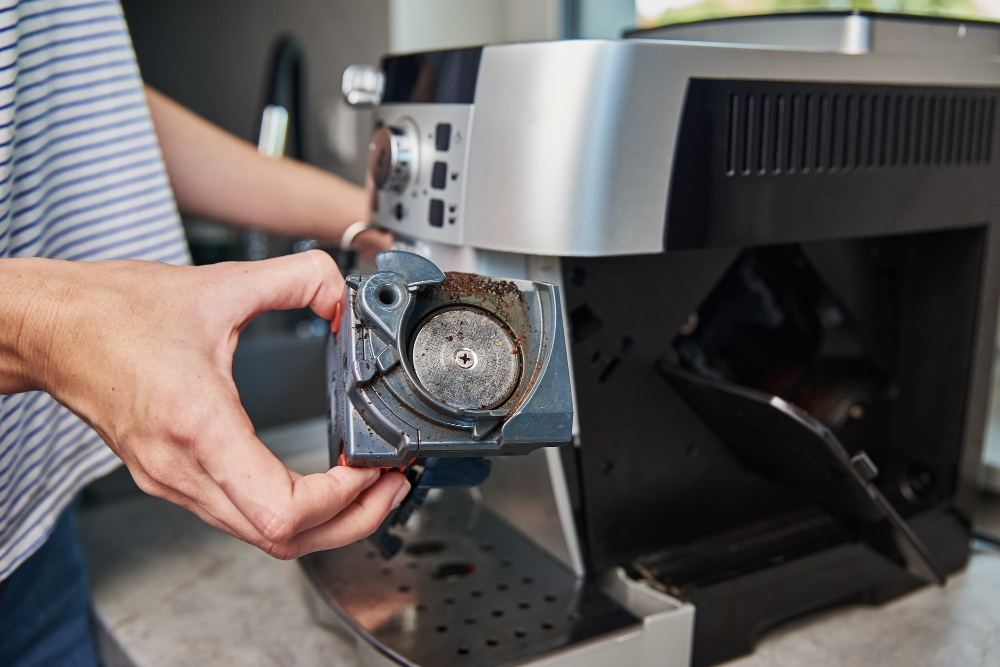
Your coffee machine is vital to your daily routine, delivering that much-needed caffeine boost every morning. But did you know that something as simple as a clogged coffee filter could lead to expensive repairs down the line? It's true! Neglecting regular maintenance can do more than impact the taste of your coffee—it can put your machine at risk of costly breakdowns.
Whether you're a coffee connoisseur or just looking to keep your coffee machine running smoothly, follow the blog to learn how to save time, frustration, and money. Learn how you can avoid coffee machine repairs in the future.
A coffee filter is a crucial part of your coffee machine that traps coffee grounds while allowing water to pass through, resulting in a smooth brew. Coffee filters come in different types, including disposable paper, reusable metal, and cloth filters.
In most coffee machines, the filter is located inside the filter basket or holder, typically near the top of the machine, right under the water reservoir. You must usually open the machine's lid or slide out the filter compartment to access it. For drip coffee makers, this is a simple lift-and-replace process. For machines like espresso makers, the filter might be in a portafilter, which can be twisted off for easy cleaning or replacement.
Clogged coffee filters may seem like a minor inconvenience, but they can cause a surprising amount of damage over time. When the filter is blocked, the water flow is restricted, forcing the machine to work harder than it should. Over time, this extra strain can wear down key components, leading to the need for a coffee machine repair.
Here's what happens:
If you're wondering whether your coffee machine's filters are clogged, look for these tell-tale signs:
Clogged filters are a gateway to more serious problems. Here's a closer look at how they can turn into bigger, pricier repairs:
The good news? Preventing clogged filters and avoiding future coffee machine repairs is easier than you think! Follow these actionable tips to keep your machine running smoothly:
Many warranties require regular maintenance, including cleaning and filter changes. Failing to do so could void the warranty, leaving you responsible for repair costs.
It's best to clean the filter after each use, especially if you brew coffee daily. Regular cleaning will prevent blockages and extend the machine's lifespan.
Both have their pros and cons. Disposable filters are convenient and hygienic but can get expensive over time. Reusable filters are eco-friendly but require regular cleaning to avoid clogs.
If you notice slower brewing times, reduced water flow, or a buildup of mineral deposits around the water tank or filter, it's time to descale your machine.
Coffee machine repairs can cost between $50 and $200, depending on the issue. Regular maintenance, like cleaning clogged filters, can help you avoid these costs.
Conclusion
Clogged coffee filters may seem minor, but they can lead to serious damage if not addressed promptly. From damaging the water pump to causing leaks, clogged filters can result in expensive coffee machine repairs. The good news is that by taking a few simple maintenance steps, you can keep your coffee machine running smoothly and avoid those costly repair bills.
Whether cleaning the filter after every use, descaling the machine, or checking for hard water issues, regular maintenance will help you get the most out of your coffee maker. If you're in Surrey and need a professional coffee machine repair, consider contacting local specialists to keep your beloved machine in tip-top shape.
If you ever need help with coffee machine repair in Surrey, act quickly before the problem worsens. Contact AMP Appliance for rapid assistance throughout Surrey, BC. Call +1 (778) 834-7026 in emergencies.
As certified technicians, we repair all major appliance brands. Whether it’s Samsung, LG, Whirlpool, GE, or Bosch, we can fix your appliance.